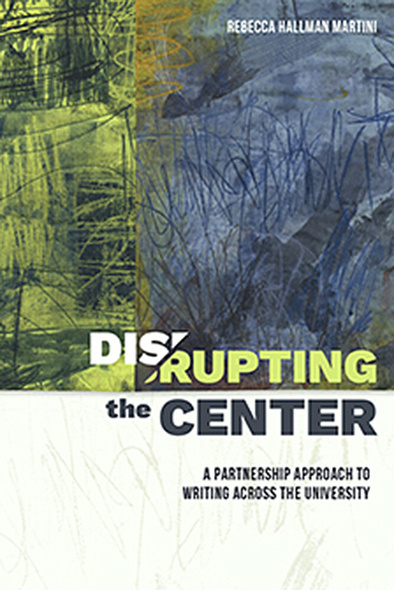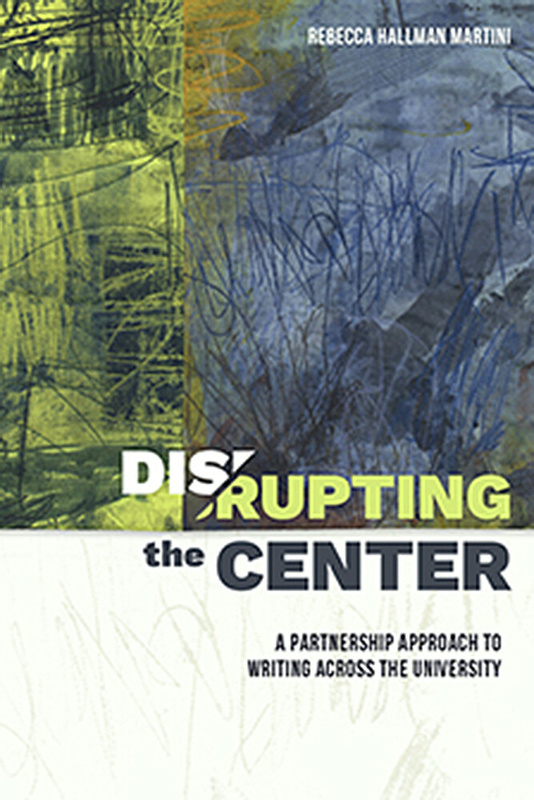Disrupting the Center
A Partnership Approach to Writing Across the University
Utah State University Press
Strategic partnership offers writing centers a framework for responding to disruptive innovations in higher education. Through partnership, writing centers can simultaneously secure resources and support the practice of tutoring writing in ways that enable moments of resistance, where writing consultants and students can tactically challenge the corporate university through their methods of practice. Disrupting the Center explicates, analyzes, and critiques one particular writing center’s partnership approach to collaboration with disciplinary faculty and upper administrators across the curriculum.
Using on-site research and critical ethnographic study from one university writing center, Rebecca Hallman Martini establishes an innovative, cross-disciplinary partnership approach to writing instruction in which peer tutoring plays an integral curricular role. Case studies detail three partnerships that respond directly to existing or potential disruptive innovations in higher education and showcase important concepts: mapping mutual benefit and stakeholder engagement in an online studio/hybrid first-year writing program partnership in response to online education, creating negotiated space to work through ethical issues involved when working with a public-private partnership to develop a required extracurricular portfolio project in a business school, and building transformational partnerships through establishing a writing-in-the-professions curriculum in the College of Engineering in response to career readiness initiatives.
Disrupting the Center uses interviews, observations, focus groups, analysis of consultations, meetings, and shared documents such as annual reports, budgets, assessment data, assignments, and syllabi to generate a wide view of how systems work. Writing centers are flexible university-wide service spaces where students go for one-on-one and group writing support that can become dynamic spaces for writing pedagogy by disrupting, revitalizing, and reinventing the epistemic foundations of current rhetoric and composition landscapes and traditional approaches to writing.
Using on-site research and critical ethnographic study from one university writing center, Rebecca Hallman Martini establishes an innovative, cross-disciplinary partnership approach to writing instruction in which peer tutoring plays an integral curricular role. Case studies detail three partnerships that respond directly to existing or potential disruptive innovations in higher education and showcase important concepts: mapping mutual benefit and stakeholder engagement in an online studio/hybrid first-year writing program partnership in response to online education, creating negotiated space to work through ethical issues involved when working with a public-private partnership to develop a required extracurricular portfolio project in a business school, and building transformational partnerships through establishing a writing-in-the-professions curriculum in the College of Engineering in response to career readiness initiatives.
Disrupting the Center uses interviews, observations, focus groups, analysis of consultations, meetings, and shared documents such as annual reports, budgets, assessment data, assignments, and syllabi to generate a wide view of how systems work. Writing centers are flexible university-wide service spaces where students go for one-on-one and group writing support that can become dynamic spaces for writing pedagogy by disrupting, revitalizing, and reinventing the epistemic foundations of current rhetoric and composition landscapes and traditional approaches to writing.
'Disrupting the Center is an important book that has come along just when it is needed most. As writing centers and composition programs face the challenges brought by institutional policies of austerity and neoliberal systems of management and planning, Rebecca Hallman Martini illustrates how writing centers can draw on their own innovative practices to create collaborative partnerships within institutions that work toward creative and sustainable change. This book offers teachers and administrators innovative theoretical and practical ideas for how to advocate for ethical pedagogical practices across campus.’
—Bronwyn T. Williams, University of Louisville
Rebecca Hallman Martini is assistant professor of English and director of the Writing Center at the University of Georgia. She is a recipient of the IWCA Ben Rafoth Graduate Research Grant as well as the IWCA Research Grant and has been awarded national and local grants for her work in community engagement and experiential learning. She is the founding editor of IWCA’s The Peer Review, and her work has been published in Praxis, Computers and Composition, Across the Disciplines, and WPA.





